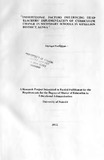| dc.description.abstract | The success of any educational organization largely depends on implementation of curriculum change. The institutional factors such as, training of school heads, work load of head teachers, school category, availability learning materials and attitude of the teachers influence implementation of change. This study therefore sought to analyses institutional factors influencing secondary school head teachers' implementation of curriculum change in Kipkelion District. To achieve this aim, the researcher formulated specific objectives and subsequently research questions. Literature relevant to the study topic was reviewed backed by the change theory by Fullan (1992) which was used to interlink between the conceptual framework of the study. Descriptive survey was used with stratified sampling used as the sampling technique. The technique allowed the researcher to use the cases that have the required information with respect to the objectives of the study.
The study was carried out in fifteen schools through descriptive survey design. The target population of the study was 30 principals, 30 deputy principals, and 120 heads of departments). A sample of 90 respondents was targeted consisting of 15 principals, 15 deputy principals and 60 HODs. The study employed two questionnaires to collect data, one for head teachers and deputy head teachers and another for heads of departments. The research instruments were self administered by the researcher a pilot study conducted to check reliability and validity of the instruments and several changes made. Data was analyzed using descriptive statistics and processed using the Statistical Package for social sciences (SPSS) and Microsoft excel software's.
The study established that administrative experience and level of education of administrators as the main personal characteristics of administrators influencing implementation curriculum change, while head teachers' training, head teachers' workload, learning materials, attitude of teachers and adequacy of facilities were established as the key institutional factors influencing implementation curriculum change. However, physical facilities and learning resources were found to be inadequate. The study concluded that training and administrative experience are therefore important prerequisites for the implementation of implementationof curriculum change if the secondary school are to implement their strategic goals and objectives and keep pace with implementation of curriculum change in secondary schools, free secondary schools needed adequate funding, facilities and learning resources, and school managements were committed to successful implementation of curriculum change.
To ensure meaningful success of the curriculum change strategy, it is recommended that elaborate and continuous training programmes be provided for head teachers, deputy head teachers and HODs and increase in the budgetary allocation of free secondary school by government to enable schools meet their strategic objectives and upgrade their facilities. The researcher suggests further research be conducted on the attitude of head teacher and other teachers on curriculum change and training needs in attitude of teachers in curriculum change. | en_US |

